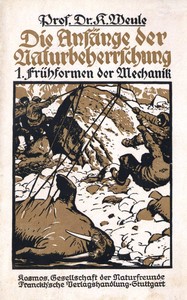Die Anfänge der Naturbeherrschung. 1. Frühformen der Mechanik by Karl Weule
"Die Anfänge der Naturbeherrschung. 1. Frühformen der Mechanik" by Karl Weule is a scientific publication written in the early 20th century. The work explores the early forms of mechanics and the relationship between mankind and nature, focusing on how humans have come to control and utilize natural forces through various mechanical innovations. The book delves into cultural and technological advancements, particularly in the context of primitive societies and the tools they developed.
At the start of this work, Weule introduces the concept of culture as the domination of nature, emphasizing the technological prowess of certain races, particularly in the aftermath of the World War era. He examines how early humans operated in a pre-civilized context, relying on basic tools while also presenting commentary on social roles, particularly the division of labor between genders. Weule's approach is ethnographic and historical, exploring how primitive cultures have innovated over time to free their hands for work through various carrying and support devices, setting the stage for the subsequent exploration of mechanics used in these cultures. (This is an automatically generated summary.)
Read or download for free
| How to read | Url | Size | |||
|---|---|---|---|---|---|
| Read now! | https://www.gutenberg.org/ebooks/55892.html.images | 239 kB | |||
| EPUB3 (E-readers incl. Send-to-Kindle) | https://www.gutenberg.org/ebooks/55892.epub3.images | 897 kB | |||
| EPUB (older E-readers) | https://www.gutenberg.org/ebooks/55892.epub.images | 900 kB | |||
| EPUB (no images, older E-readers) | https://www.gutenberg.org/ebooks/55892.epub.noimages | 141 kB | |||
| Kindle | https://www.gutenberg.org/ebooks/55892.kf8.images | 1.6 MB | |||
| older Kindles | https://www.gutenberg.org/ebooks/55892.kindle.images | 1.6 MB | |||
| Plain Text UTF-8 | https://www.gutenberg.org/ebooks/55892.txt.utf-8 | 203 kB | |||
| Download HTML (zip) | https://www.gutenberg.org/cache/epub/55892/pg55892-h.zip | 884 kB | |||
| There may be more files related to this item. | |||||
Similar Books
About this eBook
| Author | Weule, Karl, 1864-1926 |
|---|---|
| Illustrator | Wilhelm, Max |
| Title | Die Anfänge der Naturbeherrschung. 1. Frühformen der Mechanik |
| Credits |
Produced by Peter Becker and the Online Distributed Proofreading Team at www.pgdp.net |
| Reading Level | Reading ease score: 59.6 (10th to 12th grade). Somewhat difficult to read. |
| Language | German |
| LoC Class | GN: Geography, Anthropology, Recreation: Anthropology |
| Subject | Ethnology |
| Subject | Civilization -- History |
| Subject | Industries, Primitive |
| Category | Text |
| EBook-No. | 55892 |
| Release Date | Nov 5, 2017 |
| Most Recently Updated | Oct 23, 2024 |
| Copyright Status | Public domain in the USA. |
| Downloads | 284 downloads in the last 30 days. |
| Project Gutenberg eBooks are always free! | |

